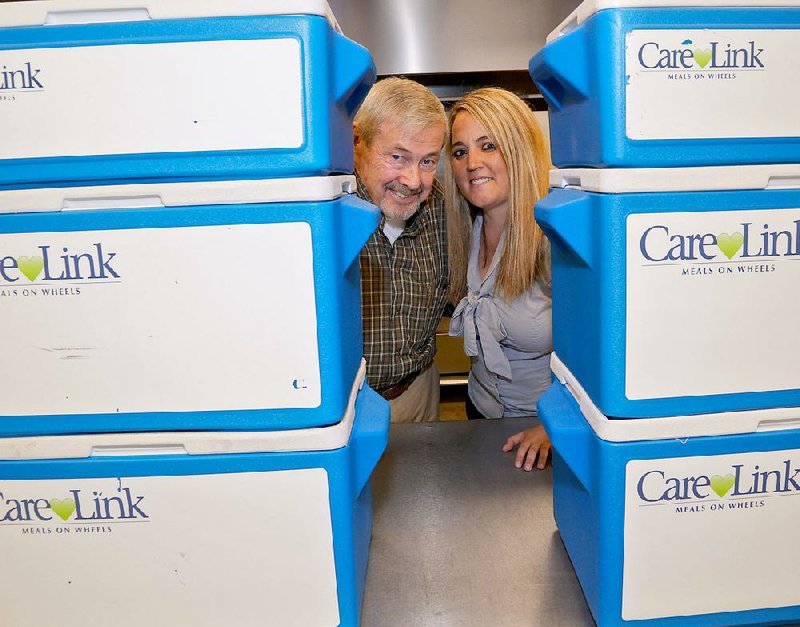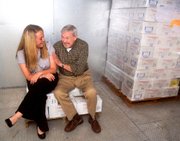For the third straight year, Arkansas ranks No. 1 in senior citizen hunger, with about 26 percent of the elderly classified as food insecure. In the case of senior citizens, food insecurity isn't directly or exclusively a result of poverty. Often, the problem is mobility -- replenishing the pantry is hard when you no longer drive and have crippling ailments.
More and more Americans are living long in infirmity, so programs like Meals on Wheels are increasingly important. As a result, organizations like CareLink (Meals on Wheels' coordinating agency) are increasingly more reliant on volunteers like Bill Richardson and Jessica Poynter to deliver hot meals to clients.
"It's a huge need," Poynter says. "It's not a want."
For years, Meals on Wheels operated out of a small kitchen that produced frozen meals delivered in batches once a week. But in June 2013, the organization opened a facility in a former Safeway grocery store in North Little Rock. The big industrial kitchen makes it possible to cook and provide 1,200 hot meals five days a week.
Of course, the production of daily hot meals meant they needed more drivers, so the organization started recruiting, attracting Poynter and Richardson in the process.
Richardson, retired from the U.S. Air Force, felt drawn to volunteer when he received a CareLink flier. He drives a twice-weekly route delivering to 19 people, many of them his contemporaries. "I can relate to them. I don't have to have a walker. I don't have to have somebody provide this for me. It sort of got to me when I first started. It makes me wonder what has happened in their life."
For Poynter, it was all about timing. Her grandparents received Meals on Wheels over one weekend during a health crisis and expressed to her how grateful they were for the help. The following Sunday, her church announced a need for volunteers.
"I just kind of felt like it was a calling," Poynter says.
Poynter and CareLink Development Director Randi Harville want to dispel a popular misconception about Meals on Wheels. It is not just for the elderly, the impoverished or people who need long-term care.
There are no financial requirements or age requirements. Many of the clients are financially comfortable and some are younger with physical or mental disabilities. And, as in the case of Poynter's grandparents, the service is available on a short-term basis, for instance during an illness.
While CareLink and Meals on Wheels do receive some federal funds from the Older Americans Act, most funding comes through donations. Also, though the meals are provided at no cost, many of the clients choose to pay for meals or otherwise donate to the organization.
"There [are] a lot of people, especially that older generation, that they don't want to take something for free," Harville says.
And Harville estimates that the 200 delivery volunteers, who drive one or more days a week through Little Rock, North Little Rock and Maumelle, save the organization $1 million every year in time alone.
CareLink calls it "The Power of One": one hour, one day a week, one gallon of gas.
There are food pick-up stations scattered throughout the delivery area, close to the volunteer's work or home and to their routes. Volunteers go to their designated post, collect the hot and cold coolers of food and their assignments for the day, then make deliveries.
For Richardson, the routine involves 17 stops twice a week. Poynter's weekly Wednesday run takes her about 50 minutes in all, and while fitting it in can be "a little challenging," it's not too much of a struggle.
If one day a week is too much, there is another option: the Saturday Supplement Program. One Saturday a month, volunteers deliver a box of shelf staples, so if there's an emergency or other problem that disrupts Meals on Wheels delivery, the clients have food in the house.
The only official duty for a volunteer driver is to deliver the meals, but the daily check-in also gives some peace of mind to clients and their family members. The daily volunteer visits provide human contact that clients need and crave, and which they tell Harville is "a Godsend."
Harville says, "The interaction that [volunteers] give them is probably right on par with the food. They need both so badly."
That's why, when winter weather closed CareLink for a day earlier this year, Richardson, who was able to get out and drive, went and picked up fast-food meals for his clients. When Poynter's meal tally was short one day, she went to a drive-thru for the remaining two meals, even though CareLink planned to deliver the missing meals quickly.
It wasn't about the food, she explains. "[Clients are] expecting you," she says. "They know who you are on a specific day. That's what they want."
Whatever they give out, Richardson and Poynter say, they get it back.
Richardson says, "The first time I went home and I told the wife, I said, 'You know, you really don't appreciate what you've got until you do this and you can see the sincere look of gratitude on their face.'"
"I can give an hour a week and it provides instant gratification," Poynter says, "knowing that I'm having a better lunch on a Wednesday than anyone in Little Rock."
For more information, call (501) 372-5300 or visit carelink.org.
High Profile on 06/21/2015

